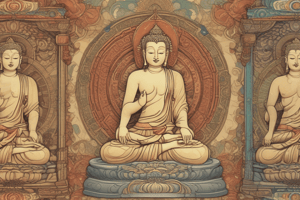Podcast
Questions and Answers
What does the term 'dukkha' signify in Buddhism?
What does the term 'dukkha' signify in Buddhism?
Dukkha signifies suffering and encompasses all forms of suffering in life, including existence, illness, and separation.
How does the concept of dukkha relate to human relationships?
How does the concept of dukkha relate to human relationships?
In human relationships, dukkha manifests as the inevitable pain of separation, regardless of the joy the relationship brings.
Why do Buddhists seek to end the cycle of rebirth?
Why do Buddhists seek to end the cycle of rebirth?
Buddhists seek to end the cycle of rebirth because each new life inevitably leads to further suffering.
What is the significance of recognizing and accepting suffering in living a spiritual life according to Buddha?
What is the significance of recognizing and accepting suffering in living a spiritual life according to Buddha?
How does material wealth relate to the understanding of suffering in Buddhism?
How does material wealth relate to the understanding of suffering in Buddhism?
Flashcards are hidden until you start studying
Study Notes
Dukkha (Suffering)
- The first noble truth in Buddhism is that life is suffering.
- Suffering encompasses all aspects of existence, including joy and pleasure.
- The fundamental problem of human existence is dukkha - suffering.
- According to Buddhism, material wealth, fame, power, and luxury cannot protect us from suffering.
- Buddhism emphasizes the importance of recognizing suffering as a natural part of life and not trying to ignore it.
- To avoid suffering, Buddhists believe it is important to accept the realities of life and deal with problems head-on.
Samudaya (The Origins of Suffering)
- The second noble truth is samudaya, which explains the origin of suffering.
- Desire, known as tanha, is the cause of suffering.
- Desire leads to attachment which causes pain when expectations aren't met.
- For example, if you desire high grades and attach yourself to that goal, you may experience suffering if you fail to achieve them.
Nirodha (The End of Suffering)
- The third noble truth is nirodha, which explains the end of suffering.
- Nirvana is the state of enlightenment that brings about the end of suffering.
- Nirvana can be attained both in this life (naturalistic nirvana) and after death (metaphysical nirvana).
- Naturalistic nirvana is liberation from worldly desires that cause suffering.
- Metaphysical nirvana is liberation from the cycle of rebirth.
Studying That Suits You
Use AI to generate personalized quizzes and flashcards to suit your learning preferences.




